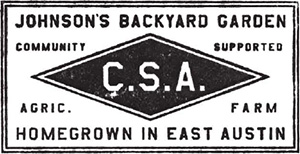
EMPLOYEE SPOTLIGHT: BECKY HUME, FARM MANAGER!
03/02/18 — Heydon Hatcher
Time for another installment of one of our most favorite blog series: the Employee Spotlight! We hope that these interviews will help acquaint you with the folks on the farm who are largely responsible for keeping the delicious JBG vegetables rolling out, week after week.
This week, our Farm Manager (and teacher of the Gardening Workshop this weekend. Don't forget to grab a ticket!), Becky Hume, took a minute out of her immensely busy schedule to sit down and elaborate on her role at the farm, her robust agricultural past, and her globe-trotting rearing. For the past year, we have been so very lucky to have such a brilliant and passionate woman leading, innovating, and finetuning operations here at JBG. Get to know this veggie-loving, two-stepping farmer in the interview below!
![]() Becky. Photo by Scott David Gordon.
Becky. Photo by Scott David Gordon.
Where were you born?
I was born in North Carolina, but my family moved overseas to China when I was 8. Then I moved to Thailand when I was 13. Most of my growing up years were spent abroad. I’ve forgotten a lot of my Chinese, but I speak Thai pretty fluently.
What is your current role at JBG?
I’m the farm manager here which means that I’m ultimately responsible for making sure that things run smoothly and that we grow bounties of beautiful vegetables! It was unique that I came into the company as the Manager, but with my ag background, Brenton felt comfortable giving me more reign to make calls about crop planning and strategy. Brenton has been spending more time focusing on development projects and the future of the farm and had passed off most all of the day to day logistics to me. Of course, he is always there if I have questions, but I think now after a year we have a great working relationship and he trusts my calls more and more without getting nervous about what’s going on at the Farm.
What is your farming background?
I got interested in agriculture in a very non-conventional way. No one in my family was agricultural. In high school, when we were living in Thailand. My father did humanitarian aid work and ran free medical clinics in rural parts of Thailand in the Hill tribes. I spent a lot of time with him on his clinics and it was clear to me that most of the health problems were related to the nutrition. So I was like, “Yeah! I wanna learn about agriculture as a 16-year-old girl with no farming experience!” My first ever farming apprenticeship was on a farm in the Philippines that was run by another missionary organization. Some of my parents’ missionary friends had previously worked there, so I ended up on this rural farm in the Philippines... there were only 5 people who spoke English in the entire compound. They focused on getting rural villages off of chemical inputs, teaching them how to manage the fertility of their own soil, and empowering them as communities to be self-sufficient. I absolutely fell in love with it. It was the hardest summer I had ever worked. I was chopping down bamboo and butchering rabbits. Totally stuff that was so non-typical for a 16-year-old girl.
![]() Photo by Scott David Gordon.
Photo by Scott David Gordon.
I decided to study ag in college. I ended up at Iowa State for my first year of college. The wake-up call was huge since my only experience with farming had to do with systems and sustainability. When I got to Iowa as it’s the heartland of agriculture, there were humongous farms of corn and soybeans as far as the eye can see. The first few weeks there were a little overwhelming, but I met an amazing female professor, Mary Weidenhoeft, a thought leader in the agro-ecological field, and she snatched me up as an advisee and totally set me on the track that I am on today. She linked me up with a lot of progressive thinkers in agriculture in Iowa. She really took me under her wing, and I got involved with organic and sustainable ag research at ISU. Despite loving Iowa-- I ended up transferring to Cornell University. I studied in their international agriculture and rural development program. It was really amazing, I really appreciate my time at Cornell. Another really special thing about my time at Cornell was that there was a farm there called Dilmun Hill. It’s a student-run farm through the university. I managed that farm for 2 years. We had about 2 acres of vegetable production and a permaculture site where we were starting to work on some research trials. It was really exciting because I got this really practical, hands-on experience with agriculture as I was also learning about it academically. I would see a pest on a plant and get to go talk to world-class experts about it. I feel incredibly thankful for that experience. Just the experiential without the academic, or vice versa - you are always missing something. Our greenhouse manager, Kirby, is an alumnus from that same farm - he managed it after me!
After Cornell, I was really interested in sustainability and post-academic agriculture. I ended up moving to an intentional community in Scotland, called the Findhorn Foundation. That was a really interesting counterbalance to a really academic perspective on agriculture. The community there has a more spiritual take on ag, they have a lot of emphasis on not only mindfulness but also connecting with the natural world. I was there for about 2 years! They also generate their own electricity and process wastewater, and I apprenticed in green building techniques. It was actually one of the first eco-villages... they kind of coined that phrase.
After that, I jumped around to a bunch of different farms. I dabbled in cut flower production for a while and eventually ended up doing an AmeriCorps program called FoodCorps, which I cannot recommend highly enough. I wish they would come here to Texas. I got placed in a nonprofit in rural Oregon and worked with the communities there to start school gardens and teach nutrition education with local schools. It was another really awesome experience of a totally different kind. I got to work with kids from kindergarten to high school, engaging them with good food while teaching nutrition and cooking. After a year there, I moved to Pennsylvania and worked in a wholesale organic greenhouse before I moved here to Austin. Once I relocated here, I worked at Joe’s Organics which is a micro-green and commercial composting farm and then briefly worked with Aguadulce, an aquaponic start-up here in town. Which brings us to now - it’s been about a year here at JBG!
![]() Photo by Scott David Gordon.
Photo by Scott David Gordon.
What have you learned from your role as farm manager here at JBG?
I’m surprised at how much of the job has been about working with people and not just with plants and the land. Something I love about this farm is that we have such a diverse array of people working here. That’s a really beautiful thing; however, it also creates challenges. There are a lot of different perspectives on how we should work together, how things should be done, and how things should be communicated. I feel like I’ve learned a lot about how to navigate that, and how to be an effective leader/what that really means. Being a leader isn’t always just being the boss, but being a leader is sometimes leading from the bottom, and making things happen. Doing those things that need to be done in order to get the system as a whole moving forward. I’ve really learned a ton about people - making them feel appreciated, getting them truly engaged in their work instead of just being bossed around. That’s kind of the difference between a good and a bad manager, right? A bad manager will just boss you around, when a good manager will make you actually care about what you are doing. Not that I do that perfectly, but it’s definitely my goal. To create a workplace where we can all communicate and feel good about what we are doing.
The other thing that I’ve learned a lot about it prioritization - in a system like this I’m never going to finish my to-do list. I’m never going to get all the things that need to be done, done. It’s been a radical shift in my thinking. What are the most important things and how do we knock them out. Decision-making on the fly is a big part of the bill. A lot of the times I don’t have time to deliberate on situations, and just need to make a decision fast as possible. It’s been a challenge, but also really fun. I definitely feel like I’ve learned a lot. I feel like a better communicator and leader than I was a year ago. I hope in another year, I’ll be even better.
What’s your favorite thing about working on a farm?
I think ultimately it’s about the honesty of it. Every job, you are putting yourself in some sort of system. I really appreciate that farming is a really honest and transparent system. We’re working with the land, harnessing sunshine and nutrients - or alchemizing really, which is immensely magical. Then, turning it into food which is nourishing people. When you look at that system, of course, nothing’s perfect, but overall as a whole, I feel really good about being a part of that system.
![]() Becky at the helm. Photo by Scott David Gordon.
Becky at the helm. Photo by Scott David Gordon.
What do you think that the biggest mistake that beginning farmers and gardeners make?
Honestly, I think the biggest mistake of beginning gardeners is that they want to grow all the sexy vegetables first. Sometimes those are the most difficult to grow. Or they choose these really crazy heirloom varieties that are very difficult to grow... we don’t even grow them here at the farm because they are so difficult. I think baby steps are really important for starters. I always advocate starting with the easiest stuff possible. A turnip, for example, you plant that seed and it grows. Even if it messes up or you can’t get a good bulb out of it, the greens are still edible! There’s no way to completely fail in that endeavor. I like to encourage folks to diversify and start with easier stuff. So they can feel successful and learn about growing and gardening before they move onto the bigger, harder stuff.
What books would you recommend for beginning farmers and gardeners?
Why do you like to teach?
It really comes down to me really loving systems. That’s really the beauty of agriculture for me, closing these loops... everything is one big system. I feel like people in our society are really disconnected from the natural world. I’m not saying that I’m the most connected person ever, but I do like to offer that space for people to engage and understand. I also really enjoy connecting with people. I really loved working and teaching kids at FoodCorps, and also at Findhorn, a big part of my role was when we had guests visit, I would work with them in the garden and teach them about gardening and meditation/mindfulness.
What’s your favorite crop? To grow and to eat?
I just can’t answer that... I feel like the more that I work with vegetables, I get more acquainted with the plant families and their specific personalities. Tomatoes are total divas, and alliums, nothing kills them... they’re so sturdy, slow, and dependable. I really feel like there’s joy and challenges with growing every crop. They’re like my children, I love them all equally. My favorite vegetable to eat is okra. I know it’s a pain to harvest, but there’s something about the sliminess that I LOVE. I’m also a huge fan of the Hakurei turnip. Every part of it is edible, and it’s so sweet + crunchy - I usually just eat it like an apple.
![]()
What made you want to work on a larger farm, and what are the challenges?
Working on this scale, it’s been a lot of hard work, but also really interesting. Having a system this large definitely forces me to think about how to do things more efficiently. Sometimes on small farms, you take twice a long to weed that one bed... in the grand scheme of things you only have a handful of beds, so you don’t have to be that aware of time spent. However, on a farm this big, you really have to be aware of how long everything is taking you. What your input costs are, what your yields are... being on this scale has just made me so much more aware of how a farm functions. It’s forced me to do things more efficiently, both with people and where machinery really makes a difference.
On a smaller farm, you are never going to plant enough sweet potatoes to make it worth it to buy something like a sweet potato planter, but on this scale and the amount we are harvesting, something like a sweet potato planter saves us time and is absolutely worth it. It’s been fun to have certain aspects of the operations be mechanized. We are in this really interesting scale... to small-scale urban farmers, JBG is a giant. To big commercial farms, JBG is small potatoes. We are right in the middle and straddling the line between very small scale and how they tend to function (fewer tractors, more by hand) and commercial farms (massive acreage, growing fewer things, and more mechanization). It’s always interesting to be constantly evaluating where we can act like a bigger farm and mechanize, or a smaller with more diversified crops and do more things by hand.
Why do you think farms like JBG are important?
I’m really proud of what JBG is in the Austin community. It feels great that we have so many CSA members that are depending on us for their weekly vegetables. They are getting local food and connecting to their region and seasons. They are also getting organic food which is more nutrient-dense and generally, much cleaner food. I do think that the role that JBG plays in the community is important, not only just providing food, but also creating a space for people to engage with their food system. I really love that we have events out at the farm and folks bring their family and kids out. Especially with my background in school gardening and nutrition education, I understand how important it is to get kids exposed to farms. Seeing them come out, see, and understand where their food is coming from is huge. A lot of kids don’t know where their food comes from. They get to pull it out of the ground, create meaningful memories, and start a relationship with food. These are habits that will last them the rest of their lives. I’m just happy that there’s that space for the community to engage and understand the food system.
![]() Photo by Scott David Gordon.
Photo by Scott David Gordon.
What are you proudest of at JBG?
The biggest thing that I’m bringing to the farm isn’t a brilliant idea or some innovation, it’s really small things. Having everything organized every day so that people come to work and they are 10 percent more efficient because they aren’t fishing around for all those things. It’s not some big, sweeping architectural change. It’s just trying to make sure that all the managers have good communication, and that just prevents that one accident where we wasted something, or something went wrong. I can’t say that there’s one big thing that I’ve revolutionized... I think it’s just more of a slow, steady input of trying to make things more organized, efficient, and more connected.
What do you wish more people knew about JBG?
We are truly unique as a farm. It is insanely unique that we are so big and so diverse simultaneously. We are actually one of the largest CSAs in the country, and on top of that, the bigger CSAs usually aggregate produce from multiple different farms. We are one of the biggest CSAs that grows all of its produce on one property.
It’s really uncommon to have a farm that does both, super diverse stuff for direct to consumer, farmers market + CSA sales plus a commercial model of selling wholesale to grocery stores, which is what we do. Sometimes it feels insane as the farm manager - both of these models usually warrant very different crop planning. For CSA and direct to consumer, it’s usually smaller scale and super diverse; whereas, with commercial, it’s usually a few crops on a really large scale. Sometimes I feel like I have two jobs since we are doing both. That’s something that’s super unique about JBG that I think a lot of people don’t understand.
Another super notable thing: that we do so much for the school district. It’s not common to have a farm that can supply to entire school districts - it makes me super happy that we can do that.
![]() Photo by Scott David Gordon.
Photo by Scott David Gordon.
What does your life look like off the farm?
I have an amazing life here in Austin. Before moving here, I was living rurally. I always felt like I had to choose between living rurally, being a farmer, and doing this thing that I love, versus living in an urban environment and losing farming. I feel SO lucky that I get to live in one of the coolest, trendiest, world-class cities, and I get to farm at the same time. It really feels like the jackpot. I love that I can really have a life and enjoy culture outside of just farming. I live with two other amazing women who are like my sisters and two of my best friends from college live and work here, too. I have an incredible and supportive boyfriend in the tech world. I come in with a lot of earthy interests and he’s coming in with very different perspective so we balance each other well. Plus, my family recently moved up to Fort Worth, so I feel super rich in Austin with new friends, old friends, and family.
What would people be surprised to learn about you?
I’m a fanatical two-step dancer. Most weekends I’m out at the honky tonk, dancing. I’m usually at the White Horse or Sam’s Town Point these days. I really love to dance.
What are you cooking up in your kitchen these days?
I like to cook a lot of Asian inspired food. I learned how to cook Thai food growing up in Thailand. Curries and Thai-inspired dishes. My boyfriend is actually from India, so I’ve been trying to incorporate more of those Indian spices and making more Indian curries. I’m a huge meat lover, so I love to cook roasts and steaks, too.
If you were stuck on a desert island, what three things would you bring?
Rationally?
Whimsically?
Casey: I would say a carrot. Strong, dependable, and sweet. They both keeps the farm going!
Krishna: Daikon. I think she has to be bold and put a foot down with all the guys working at the farm.
A huge thanks to Becky for her constant hard work and for chatting with us! Be sure to come and see us this weekend at the Transplant Sale and learn gardening pro-tips at the Gardening Workshop from the master herself, Becky! Get your tickets here!
This week, our Farm Manager (and teacher of the Gardening Workshop this weekend. Don't forget to grab a ticket!), Becky Hume, took a minute out of her immensely busy schedule to sit down and elaborate on her role at the farm, her robust agricultural past, and her globe-trotting rearing. For the past year, we have been so very lucky to have such a brilliant and passionate woman leading, innovating, and finetuning operations here at JBG. Get to know this veggie-loving, two-stepping farmer in the interview below!
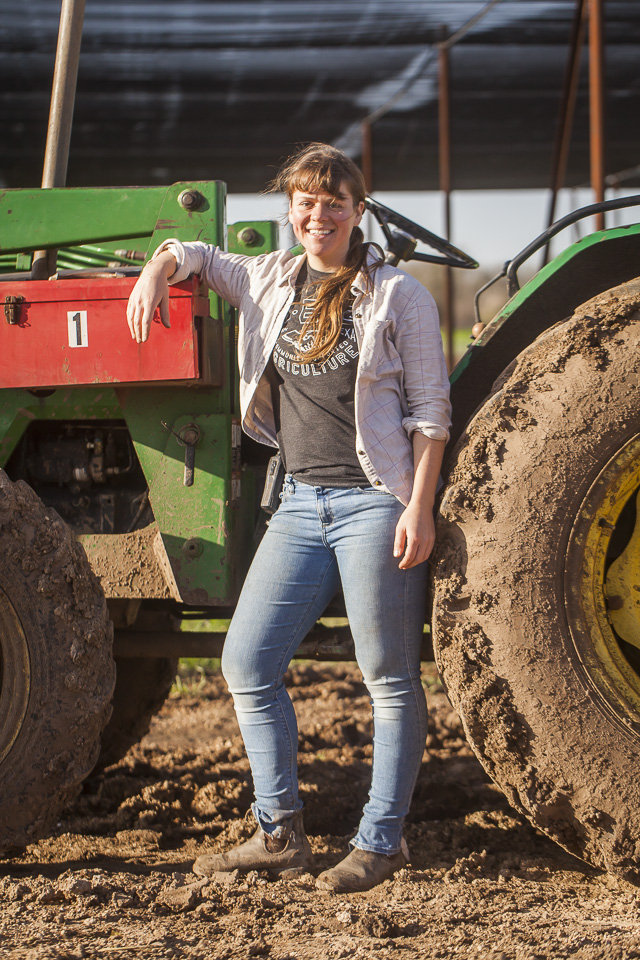 Becky. Photo by Scott David Gordon.
Becky. Photo by Scott David Gordon.
Where were you born?
I was born in North Carolina, but my family moved overseas to China when I was 8. Then I moved to Thailand when I was 13. Most of my growing up years were spent abroad. I’ve forgotten a lot of my Chinese, but I speak Thai pretty fluently.
What is your current role at JBG?
I’m the farm manager here which means that I’m ultimately responsible for making sure that things run smoothly and that we grow bounties of beautiful vegetables! It was unique that I came into the company as the Manager, but with my ag background, Brenton felt comfortable giving me more reign to make calls about crop planning and strategy. Brenton has been spending more time focusing on development projects and the future of the farm and had passed off most all of the day to day logistics to me. Of course, he is always there if I have questions, but I think now after a year we have a great working relationship and he trusts my calls more and more without getting nervous about what’s going on at the Farm.
What is your farming background?
I got interested in agriculture in a very non-conventional way. No one in my family was agricultural. In high school, when we were living in Thailand. My father did humanitarian aid work and ran free medical clinics in rural parts of Thailand in the Hill tribes. I spent a lot of time with him on his clinics and it was clear to me that most of the health problems were related to the nutrition. So I was like, “Yeah! I wanna learn about agriculture as a 16-year-old girl with no farming experience!” My first ever farming apprenticeship was on a farm in the Philippines that was run by another missionary organization. Some of my parents’ missionary friends had previously worked there, so I ended up on this rural farm in the Philippines... there were only 5 people who spoke English in the entire compound. They focused on getting rural villages off of chemical inputs, teaching them how to manage the fertility of their own soil, and empowering them as communities to be self-sufficient. I absolutely fell in love with it. It was the hardest summer I had ever worked. I was chopping down bamboo and butchering rabbits. Totally stuff that was so non-typical for a 16-year-old girl.
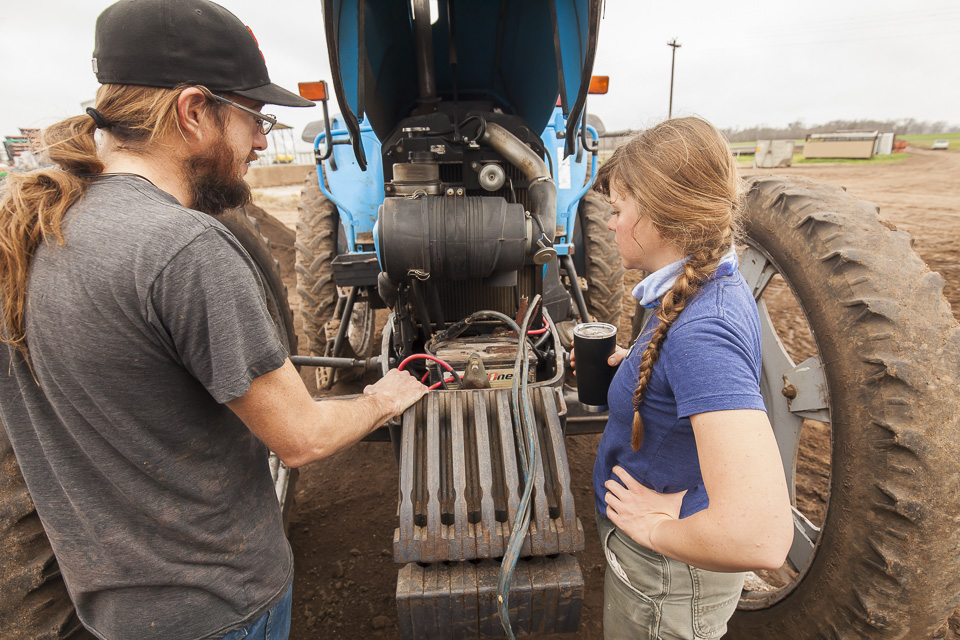 Photo by Scott David Gordon.
Photo by Scott David Gordon.
I decided to study ag in college. I ended up at Iowa State for my first year of college. The wake-up call was huge since my only experience with farming had to do with systems and sustainability. When I got to Iowa as it’s the heartland of agriculture, there were humongous farms of corn and soybeans as far as the eye can see. The first few weeks there were a little overwhelming, but I met an amazing female professor, Mary Weidenhoeft, a thought leader in the agro-ecological field, and she snatched me up as an advisee and totally set me on the track that I am on today. She linked me up with a lot of progressive thinkers in agriculture in Iowa. She really took me under her wing, and I got involved with organic and sustainable ag research at ISU. Despite loving Iowa-- I ended up transferring to Cornell University. I studied in their international agriculture and rural development program. It was really amazing, I really appreciate my time at Cornell. Another really special thing about my time at Cornell was that there was a farm there called Dilmun Hill. It’s a student-run farm through the university. I managed that farm for 2 years. We had about 2 acres of vegetable production and a permaculture site where we were starting to work on some research trials. It was really exciting because I got this really practical, hands-on experience with agriculture as I was also learning about it academically. I would see a pest on a plant and get to go talk to world-class experts about it. I feel incredibly thankful for that experience. Just the experiential without the academic, or vice versa - you are always missing something. Our greenhouse manager, Kirby, is an alumnus from that same farm - he managed it after me!
After Cornell, I was really interested in sustainability and post-academic agriculture. I ended up moving to an intentional community in Scotland, called the Findhorn Foundation. That was a really interesting counterbalance to a really academic perspective on agriculture. The community there has a more spiritual take on ag, they have a lot of emphasis on not only mindfulness but also connecting with the natural world. I was there for about 2 years! They also generate their own electricity and process wastewater, and I apprenticed in green building techniques. It was actually one of the first eco-villages... they kind of coined that phrase.
After that, I jumped around to a bunch of different farms. I dabbled in cut flower production for a while and eventually ended up doing an AmeriCorps program called FoodCorps, which I cannot recommend highly enough. I wish they would come here to Texas. I got placed in a nonprofit in rural Oregon and worked with the communities there to start school gardens and teach nutrition education with local schools. It was another really awesome experience of a totally different kind. I got to work with kids from kindergarten to high school, engaging them with good food while teaching nutrition and cooking. After a year there, I moved to Pennsylvania and worked in a wholesale organic greenhouse before I moved here to Austin. Once I relocated here, I worked at Joe’s Organics which is a micro-green and commercial composting farm and then briefly worked with Aguadulce, an aquaponic start-up here in town. Which brings us to now - it’s been about a year here at JBG!
 Photo by Scott David Gordon.
Photo by Scott David Gordon.
What have you learned from your role as farm manager here at JBG?
I’m surprised at how much of the job has been about working with people and not just with plants and the land. Something I love about this farm is that we have such a diverse array of people working here. That’s a really beautiful thing; however, it also creates challenges. There are a lot of different perspectives on how we should work together, how things should be done, and how things should be communicated. I feel like I’ve learned a lot about how to navigate that, and how to be an effective leader/what that really means. Being a leader isn’t always just being the boss, but being a leader is sometimes leading from the bottom, and making things happen. Doing those things that need to be done in order to get the system as a whole moving forward. I’ve really learned a ton about people - making them feel appreciated, getting them truly engaged in their work instead of just being bossed around. That’s kind of the difference between a good and a bad manager, right? A bad manager will just boss you around, when a good manager will make you actually care about what you are doing. Not that I do that perfectly, but it’s definitely my goal. To create a workplace where we can all communicate and feel good about what we are doing.
The other thing that I’ve learned a lot about it prioritization - in a system like this I’m never going to finish my to-do list. I’m never going to get all the things that need to be done, done. It’s been a radical shift in my thinking. What are the most important things and how do we knock them out. Decision-making on the fly is a big part of the bill. A lot of the times I don’t have time to deliberate on situations, and just need to make a decision fast as possible. It’s been a challenge, but also really fun. I definitely feel like I’ve learned a lot. I feel like a better communicator and leader than I was a year ago. I hope in another year, I’ll be even better.
What’s your favorite thing about working on a farm?
I think ultimately it’s about the honesty of it. Every job, you are putting yourself in some sort of system. I really appreciate that farming is a really honest and transparent system. We’re working with the land, harnessing sunshine and nutrients - or alchemizing really, which is immensely magical. Then, turning it into food which is nourishing people. When you look at that system, of course, nothing’s perfect, but overall as a whole, I feel really good about being a part of that system.
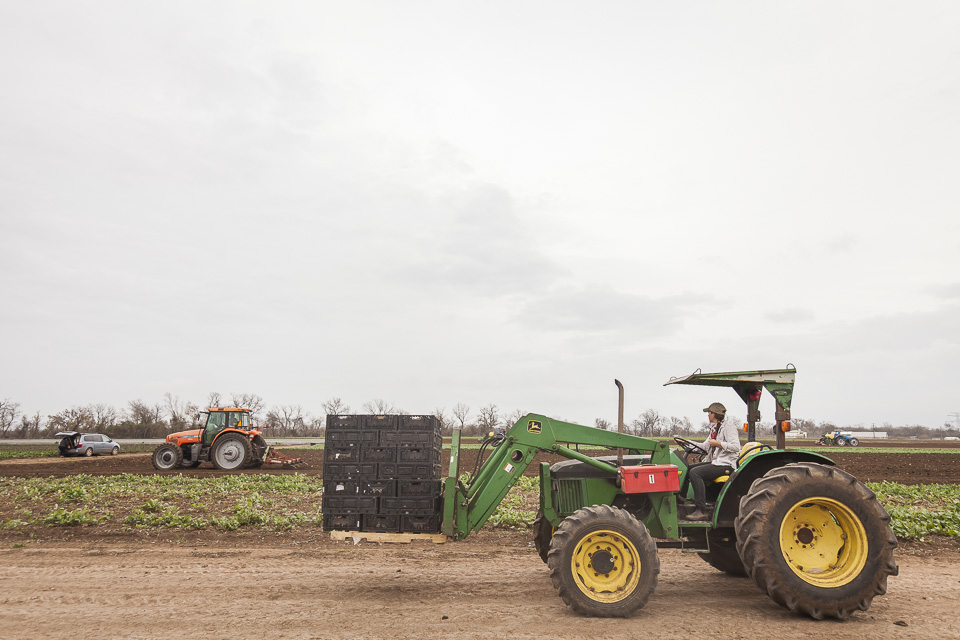 Becky at the helm. Photo by Scott David Gordon.
Becky at the helm. Photo by Scott David Gordon.
What do you think that the biggest mistake that beginning farmers and gardeners make?
Honestly, I think the biggest mistake of beginning gardeners is that they want to grow all the sexy vegetables first. Sometimes those are the most difficult to grow. Or they choose these really crazy heirloom varieties that are very difficult to grow... we don’t even grow them here at the farm because they are so difficult. I think baby steps are really important for starters. I always advocate starting with the easiest stuff possible. A turnip, for example, you plant that seed and it grows. Even if it messes up or you can’t get a good bulb out of it, the greens are still edible! There’s no way to completely fail in that endeavor. I like to encourage folks to diversify and start with easier stuff. So they can feel successful and learn about growing and gardening before they move onto the bigger, harder stuff.
What books would you recommend for beginning farmers and gardeners?
- Sustainable Vegetable Production from Start-Up to Market by Vernon P Grubinger
- Knott’s Handbook for Vegetable Growers by Donald N Maynard & George J Hochmuth
Why do you like to teach?
It really comes down to me really loving systems. That’s really the beauty of agriculture for me, closing these loops... everything is one big system. I feel like people in our society are really disconnected from the natural world. I’m not saying that I’m the most connected person ever, but I do like to offer that space for people to engage and understand. I also really enjoy connecting with people. I really loved working and teaching kids at FoodCorps, and also at Findhorn, a big part of my role was when we had guests visit, I would work with them in the garden and teach them about gardening and meditation/mindfulness.
What’s your favorite crop? To grow and to eat?
I just can’t answer that... I feel like the more that I work with vegetables, I get more acquainted with the plant families and their specific personalities. Tomatoes are total divas, and alliums, nothing kills them... they’re so sturdy, slow, and dependable. I really feel like there’s joy and challenges with growing every crop. They’re like my children, I love them all equally. My favorite vegetable to eat is okra. I know it’s a pain to harvest, but there’s something about the sliminess that I LOVE. I’m also a huge fan of the Hakurei turnip. Every part of it is edible, and it’s so sweet + crunchy - I usually just eat it like an apple.
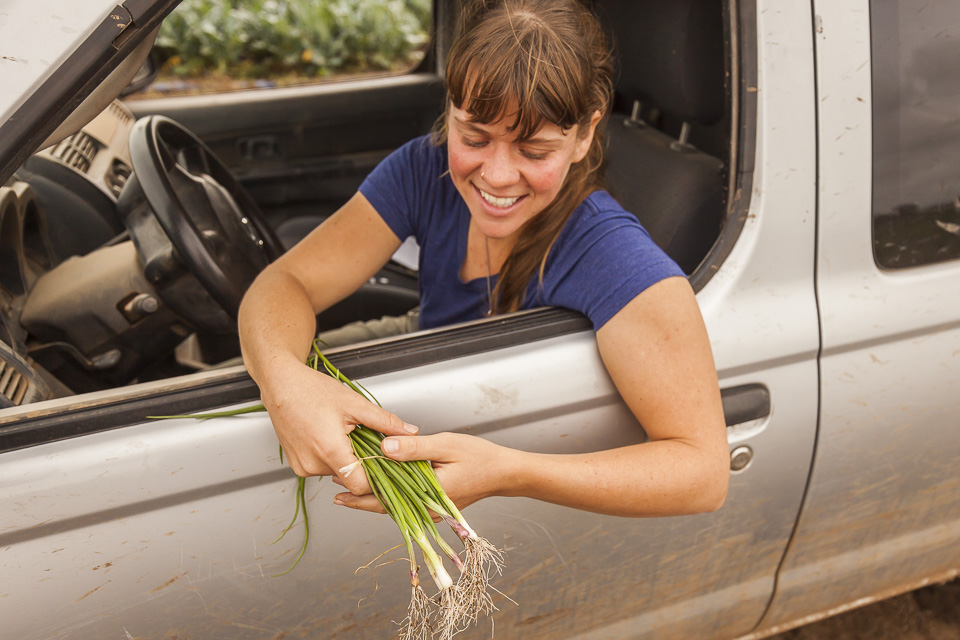
What made you want to work on a larger farm, and what are the challenges?
Working on this scale, it’s been a lot of hard work, but also really interesting. Having a system this large definitely forces me to think about how to do things more efficiently. Sometimes on small farms, you take twice a long to weed that one bed... in the grand scheme of things you only have a handful of beds, so you don’t have to be that aware of time spent. However, on a farm this big, you really have to be aware of how long everything is taking you. What your input costs are, what your yields are... being on this scale has just made me so much more aware of how a farm functions. It’s forced me to do things more efficiently, both with people and where machinery really makes a difference.
On a smaller farm, you are never going to plant enough sweet potatoes to make it worth it to buy something like a sweet potato planter, but on this scale and the amount we are harvesting, something like a sweet potato planter saves us time and is absolutely worth it. It’s been fun to have certain aspects of the operations be mechanized. We are in this really interesting scale... to small-scale urban farmers, JBG is a giant. To big commercial farms, JBG is small potatoes. We are right in the middle and straddling the line between very small scale and how they tend to function (fewer tractors, more by hand) and commercial farms (massive acreage, growing fewer things, and more mechanization). It’s always interesting to be constantly evaluating where we can act like a bigger farm and mechanize, or a smaller with more diversified crops and do more things by hand.
Why do you think farms like JBG are important?
I’m really proud of what JBG is in the Austin community. It feels great that we have so many CSA members that are depending on us for their weekly vegetables. They are getting local food and connecting to their region and seasons. They are also getting organic food which is more nutrient-dense and generally, much cleaner food. I do think that the role that JBG plays in the community is important, not only just providing food, but also creating a space for people to engage with their food system. I really love that we have events out at the farm and folks bring their family and kids out. Especially with my background in school gardening and nutrition education, I understand how important it is to get kids exposed to farms. Seeing them come out, see, and understand where their food is coming from is huge. A lot of kids don’t know where their food comes from. They get to pull it out of the ground, create meaningful memories, and start a relationship with food. These are habits that will last them the rest of their lives. I’m just happy that there’s that space for the community to engage and understand the food system.
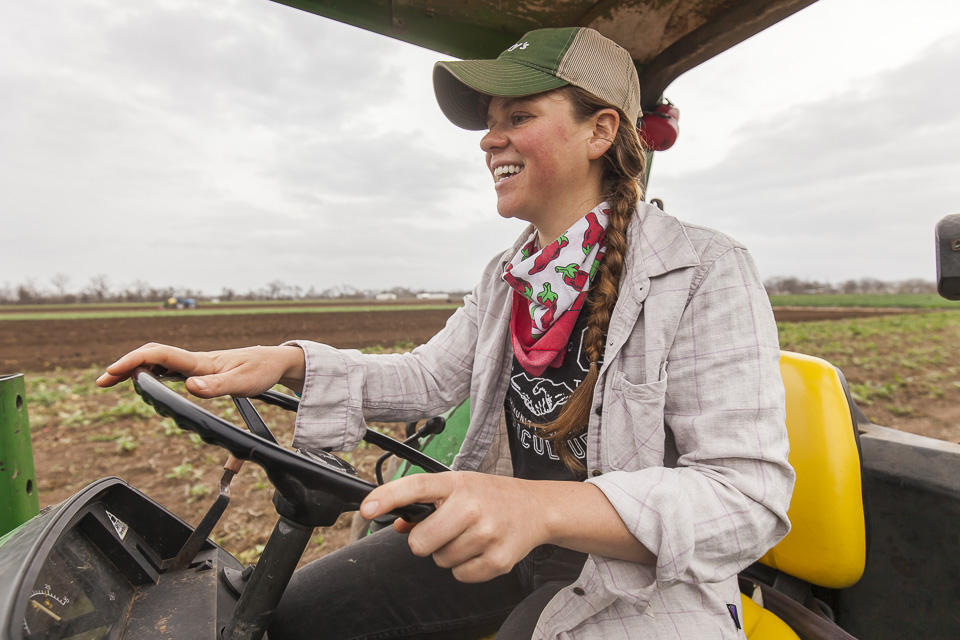 Photo by Scott David Gordon.
Photo by Scott David Gordon.
What are you proudest of at JBG?
The biggest thing that I’m bringing to the farm isn’t a brilliant idea or some innovation, it’s really small things. Having everything organized every day so that people come to work and they are 10 percent more efficient because they aren’t fishing around for all those things. It’s not some big, sweeping architectural change. It’s just trying to make sure that all the managers have good communication, and that just prevents that one accident where we wasted something, or something went wrong. I can’t say that there’s one big thing that I’ve revolutionized... I think it’s just more of a slow, steady input of trying to make things more organized, efficient, and more connected.
What do you wish more people knew about JBG?
We are truly unique as a farm. It is insanely unique that we are so big and so diverse simultaneously. We are actually one of the largest CSAs in the country, and on top of that, the bigger CSAs usually aggregate produce from multiple different farms. We are one of the biggest CSAs that grows all of its produce on one property.
It’s really uncommon to have a farm that does both, super diverse stuff for direct to consumer, farmers market + CSA sales plus a commercial model of selling wholesale to grocery stores, which is what we do. Sometimes it feels insane as the farm manager - both of these models usually warrant very different crop planning. For CSA and direct to consumer, it’s usually smaller scale and super diverse; whereas, with commercial, it’s usually a few crops on a really large scale. Sometimes I feel like I have two jobs since we are doing both. That’s something that’s super unique about JBG that I think a lot of people don’t understand.
Another super notable thing: that we do so much for the school district. It’s not common to have a farm that can supply to entire school districts - it makes me super happy that we can do that.
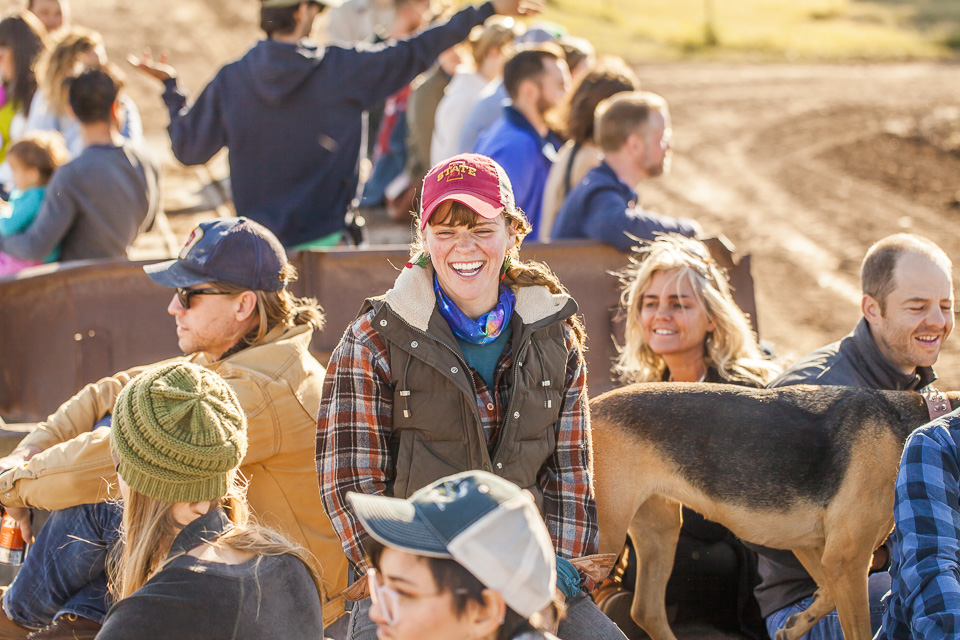 Photo by Scott David Gordon.
Photo by Scott David Gordon.
What does your life look like off the farm?
I have an amazing life here in Austin. Before moving here, I was living rurally. I always felt like I had to choose between living rurally, being a farmer, and doing this thing that I love, versus living in an urban environment and losing farming. I feel SO lucky that I get to live in one of the coolest, trendiest, world-class cities, and I get to farm at the same time. It really feels like the jackpot. I love that I can really have a life and enjoy culture outside of just farming. I live with two other amazing women who are like my sisters and two of my best friends from college live and work here, too. I have an incredible and supportive boyfriend in the tech world. I come in with a lot of earthy interests and he’s coming in with very different perspective so we balance each other well. Plus, my family recently moved up to Fort Worth, so I feel super rich in Austin with new friends, old friends, and family.
What would people be surprised to learn about you?
I’m a fanatical two-step dancer. Most weekends I’m out at the honky tonk, dancing. I’m usually at the White Horse or Sam’s Town Point these days. I really love to dance.
What are you cooking up in your kitchen these days?
I like to cook a lot of Asian inspired food. I learned how to cook Thai food growing up in Thailand. Curries and Thai-inspired dishes. My boyfriend is actually from India, so I’ve been trying to incorporate more of those Indian spices and making more Indian curries. I’m a huge meat lover, so I love to cook roasts and steaks, too.
If you were stuck on a desert island, what three things would you bring?
Rationally?
- A pocket knife
- A tarp
- 55-gallon barrel for water storage
Whimsically?
- Amazing speaker set up
- My cat
- My kitchen
Casey: I would say a carrot. Strong, dependable, and sweet. They both keeps the farm going!
Krishna: Daikon. I think she has to be bold and put a foot down with all the guys working at the farm.
A huge thanks to Becky for her constant hard work and for chatting with us! Be sure to come and see us this weekend at the Transplant Sale and learn gardening pro-tips at the Gardening Workshop from the master herself, Becky! Get your tickets here!






 0 ITEMS IN CART
0 ITEMS IN CART 
